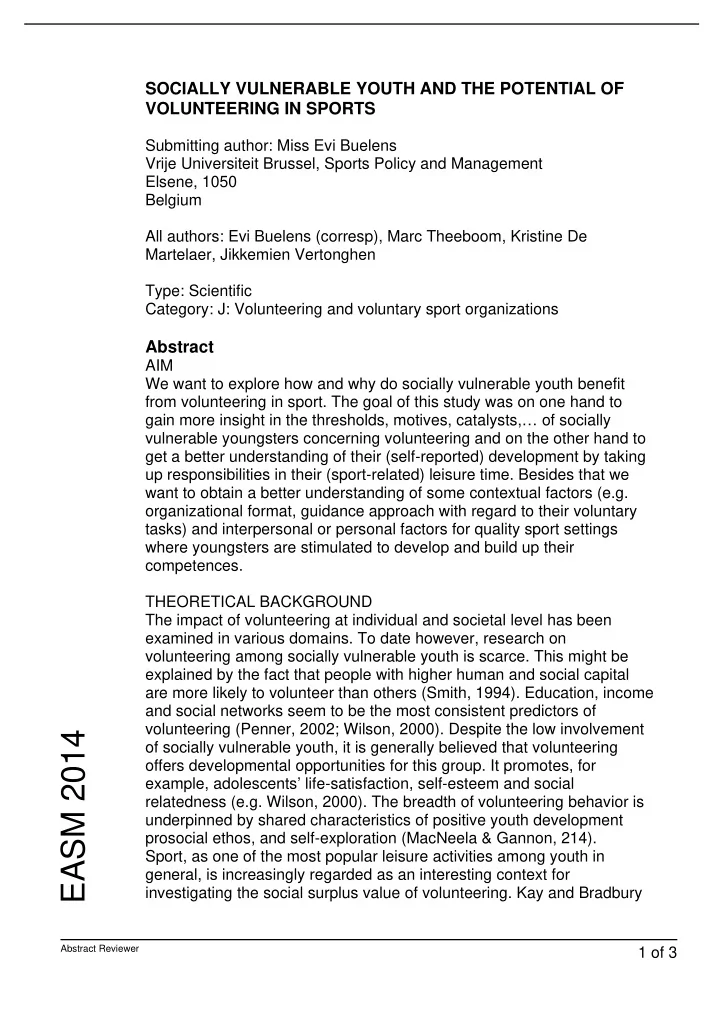

SOCIALLY VULNERABLE YOUTH AND THE POTENTIAL OF VOLUNTEERING IN SPORTS Submitting author: Miss Evi Buelens Vrije Universiteit Brussel, Sports Policy and Management Elsene, 1050 Belgium All authors: Evi Buelens (corresp), Marc Theeboom, Kristine De Martelaer, Jikkemien Vertonghen Type: Scientific Category: J: Volunteering and voluntary sport organizations Abstract AIM� We want to explore how and why do socially vulnerable youth benefit from volunteering in sport. The goal of this study was on one hand to gain more insight in the thresholds, motives, catalysts,… of socially vulnerable youngsters concerning volunteering and on the other hand to get a better understanding of their (self-reported) development by taking up responsibilities in their (sport-related) leisure time. Besides that we want to obtain a better understanding of some contextual factors (e.g. organizational format, guidance approach with regard to their voluntary tasks) and interpersonal or personal factors for quality sport settings where youngsters are stimulated to develop and build up their competences. � � THEORETICAL BACKGROUND � The impact of volunteering at individual and societal level has been examined in various domains. To date however, research on volunteering among socially vulnerable youth is scarce. This might be explained by the fact that people with higher human and social capital are more likely to volunteer than others (Smith, 1994). Education, income and social networks seem to be the most consistent predictors of volunteering (Penner, 2002; Wilson, 2000). Despite the low involvement EASM 2014 of socially vulnerable youth, it is generally believed that volunteering offers developmental opportunities for this group. It promotes, for example, adolescents’ life-satisfaction, self-esteem and social relatedness (e.g. Wilson, 2000). The breadth of volunteering behavior is underpinned by shared characteristics of positive youth development prosocial ethos, and self-exploration (MacNeela & Gannon, 214).� Sport, as one of the most popular leisure activities among youth in general, is increasingly regarded as an interesting context for investigating the social surplus value of volunteering. Kay and Bradbury Abstract Reviewer 1 of 3
(2009) found in their research that taking up responsibilities in sports can contribute to the development of youngsters. Recent Flemish research illustrated that sport is a highly accessible activity allowing large numbers of youngsters to become involved. Moreover, sports-based practices seem to be more capable in attracting young people independently of their socio-economic background in comparison to other socio-cultural activities and seem to provide rich contexts for reaching socially vulnerable youths and investigate the surplus value of volunteering (Haudenhuyse et al., 2012). � � METHODOLOGY RESEARCH DESIGN AND DATA ANALYSIS � In this study we wanted to reach our goal by means of a qualitative methodology (in-depth interviews), data were collected among socially vulnerable youngsters who are taking up responsibilities in their (sport- related) leisure time for more than one year (n = 22); and program organizers (n = 10). The youngsters were between 15 and 26 years old. Data were collected during a period of 3 months (November 2013- January 2014). � Five different leisure contexts in Flanders (northern Dutch-speaking region of Belgium) were taken into account, one neighbourhood sport practice, and four sport practices supported by a professional (e.g. youth worker). Sports contexts with the specific goal of developing socially vulnerable youngsters through volunteering were taken into account. Content analysis was used to analyse the interviews, using QSR NVivo 10 software. � � RESULTS, DISCUSSION AND IMPLICATIONS� This study investigated the impact of volunteering on socially vulnerable youngsters in different (sport-related) leisure contexts, all aimed at making (socially vulnerable) youngsters good/better volunteers and stimulate them to develop their sports related and personality related competences. Results of the study showed that youth indicated both personal and interpersonal processes of development (e.g. increased self-esteem, better relations with peers). It is concluded that a systematic support of socially vulnerable youngsters in their volunteering can play an important role in the development of their competences as a volunteer as well as an individual. � � EASM 2014 At this moment all results are not yet available at the time of abstract submission. We guarantee that besides the results discussed above, the results concerning the contextual factors will also be presented at the conference. References REFERENCES� � Haudenhuyse, R, Theeboom, M., & Nols, Z. (2012). Sports-based Abstract Reviewer 2 of 3
interventions for socially vulnerable youth: Towards well-defined interventions with easy-to-follow outcomes? International Review for the Sociology of Sport, 0 (0), 1-14.� � Kay, T., & Bradbury, S. (2009). Youth sport volunteering: developing social capital?. Sport, Education and Society, 14:1, 121-140.� � MacNeela, P., & Gannon, N. (2014). Phenomenological Analysis of University Student Volunteering Process and Positive Development: An Interpretative. Journal of Adolescent Research Vol. 29(3) 407–436. � � Penner, L. A. (2002). Dispositional and organizational influences on sustained volunteerism: An interactionist perspective. Journal of Social Issues, 58, 447−467.� � Smith, D. H. (1994). Determinants of voluntary association participation and volunteering: A literature review. Nonprofit and Voluntary Sector Quarterly, 23, 243−263.� � Wilson, J. (2000). Volunteering. Annual Review of Sociology, 26, 215−240 EASM 2014 Abstract Reviewer 3 of 3
Recommend
More recommend